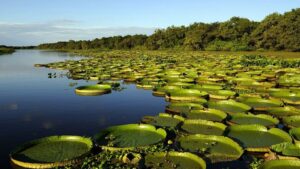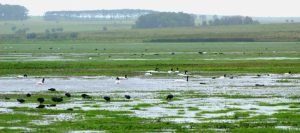Wetlands constitute a diverse and unique ecosystem, located at the intersection of land and water. They are natural systems that are highly complex, dynamic, and highly productive, housing different species of waterbirds, although they are also among the most fragile on the planet.
Their enormous ecological value and the multiple benefits they provide are widely recognized. However, until well into the 20th century, these spaces were considered unproductive and associated with the spread of diseases, leading to their transformation into agricultural and livestock lands.
This approach caused a drastic reduction of wetlands worldwide. According to data from the Ramsar Convention, around 90% of these ecosystems have been lost since 1700. Although the rate of disappearance has decreased in recent decades, it remains a looming threat, leading to the creation of protection and conservation measures.
 El deterioro de los humedales.[/caption>
El deterioro de los humedales.[/caption>
Decrease in wintering waterbird populations
The report also analyzes the evolution of wintering waterbird populations in Spain over two periods: the long term (1990-2023) and the short term (2007-2023). Out of the 67 species evaluated, 36 experienced a population decline, showing a negative trend.
Common species such as the greylag goose, the Eurasian coot, the common moorhen, the mallard, and the cattle egret recorded concerning declines. Additionally, the three most important wetlands for wintering in Spain –Doñana, the Ebro Delta, and Albufera de Valencia– are experiencing regressive trends in their bird populations.
Álvarez explains the reasons for this decline: “Waterbird species experienced a global reduction due to wetland degradation caused by changes in land use, pollution, and overexploitation of water resources. Added to the effects of climate change, a shift in wintering and breeding areas towards the northern Iberian Peninsula is expected, where water availability and environmental conditions are more favorable.”

Status of the main wetlands
- Doñana: Water overexploitation for agriculture and droughts have severely deteriorated its aquatic ecosystems. In January 2024, waterbird censuses reflected the worst wintering season in the park’s history, with only 122,196 individuals.
- Ebro Delta: Although still a crucial refuge for wintering waterbirds, there has been a decrease in duck and coot populations in recent years.
- Albufera de Valencia: This wetland hosts between 20,000 and 40,000 ducks every winter, but its populations have also shown a negative trend.
The importance of wetlands
Wetlands play a key role for the environment, as these spaces retain and store water, available for consumption, production, and wildlife sustenance. Additionally, these places help prevent floods by recharging aquifers and improving water quality.
Conservation of wetlands is essential to ensure ecological balance and the survival of species that depend on them. The restoration of these ecosystems and the implementation of adequate protection measures are crucial to reverse biodiversity decline and improve resilience to climate change.
Time is of the essence, and collaboration between administrations, environmental organizations, and society is essential to prevent the irreversible loss of these valuable natural spaces.
<a href="http://las%204%20erres%20del%20reciclaje%20reflejan%20un%20cambio%20de%20perspectiva%20y%20actitud.xn--%20ser%20conscientes%20de%20que%20la%20vida%20de%20un%20objeto%20puede%20extenderse%20es%20fundamental,%20ya%20que%20permitir%20que%20los%20recursos%20del%20planeta%20no%20se%20agoten%20tan%20rpido%20ni%20de%20manera%20irresponsable-ltsud.%20es%20momento%20de%20actuar.xn--%20muchos%20ya%20conocen%20las%20conductas%20necesarias%20que%20debemos%20adoptar%20en%20nuestro%20da%20a%20da%20para%20ayudar%20al%20medio%20ambiente%20a%20travs%20del%20reciclaje-vwpw0cja.xn--%20%20por%20qu%20apostar%20por%20el%20reciclaje-uqc08r/?%20%20%20Aunque%20existen%20personas%20de%20diferentes%20nacionalidades%20que%20niegan%20la%20existencia%20del%20cambio%20clim%C3%A1tico,%20este%20ya%20es%20una%20realidad%20que%20debemos%20afrontar.%20Todos%20podemos%20contribuir%20a%20mitigar%20y%20detener%20este%20problema%20aportando%20nuestro%20granito%20de%20arena.%20%20Hasta%20hace%20poco,%20se%20hablaba%20de%20las%203%20erres%20en%20el%20contexto%20del%20reciclaje.%20Sin%20embargo,%20con%20el%20tiempo%20y%20la%20aparici%C3%B3n%20de%20conceptos%20como%20sostenibilidad,%20resiliencia%20y%20econom%C3%ADa%20circular,%20se%20evidenci%C3%B3%20la%20necesidad%20de%20a%C3%B1adir%20una%20cuarta%20erre.%20Hoy%20en%20d%C3%ADa,%20el%20concepto%20del%20reciclaje%20incluye:%20Reducir,%20Reutilizar,%20Reciclar%20y%20Recuperar.%20%20Reducir%20%20Esta%20forma%20de%20reciclaje%20consiste%20en%20evitar%20la%20compra%20de%20productos%20innecesarios,%20especialmente%20aquellos%20con%20exceso%20de%20embalaje%20(como%20bolsas%20de%20pl%C3%A1stico%20para%20frutas%20o%20verduras).%20No%20solo%20se%20trata%20de%20reducir%20el%20consumo%20de%20bienes,%20sino%20tambi%C3%A9n%20de%20energ%C3%ADa,%20optimizando%20el%

